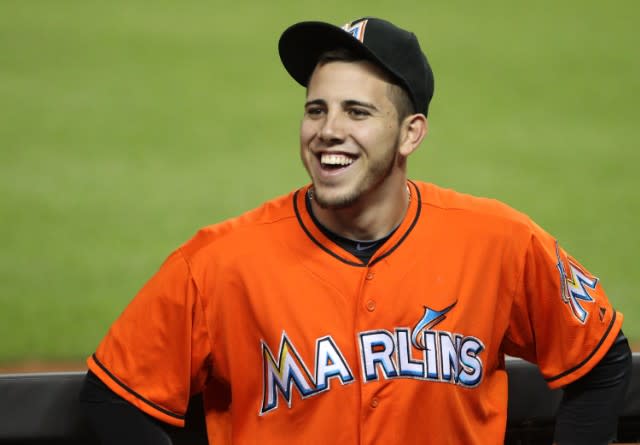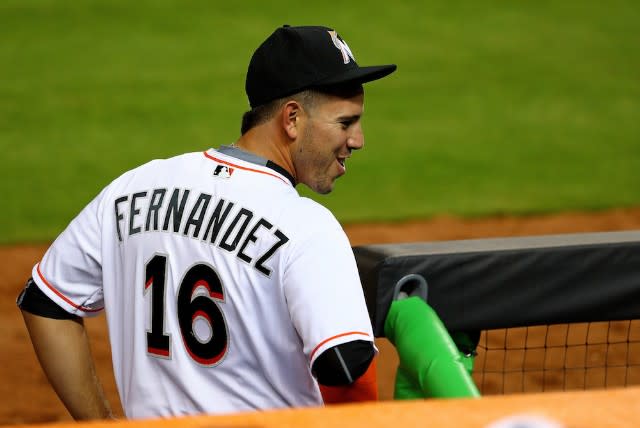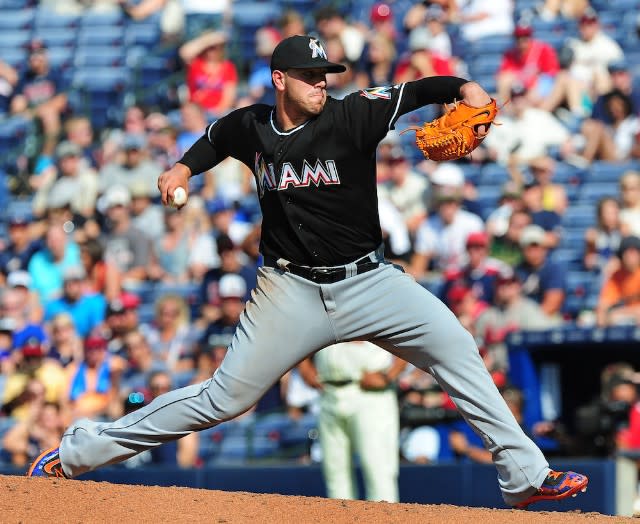Miami Marlin José Fernández Will Live On As An Angel In The Outfield
Baseball was the first sport I played as a child growing up in South Florida. Since I was the only Cuban-American on my team, I felt like my unique background gave me both the direction to be proud of my heritage, and the opportunity to shine as a standout shortstop on the field. I was attentive to the ball and paid careful attention to my opponents, as they leaned on the edge of a base and prepared to jet home. My struggles in school and growing pains at home seemed to dissolve once the excitement of going to practice and the adrenaline rush of improving my killer swing set in.
I didn’t grow up to become a professional baseball player. José Fernández, on the other hand, was able to flip his struggles and use them as a catalyst for major league success. The 24-year-old would go on to become a most memorable player of the Miami Marlins, one that everyone came to know and love, with his wildly infectious smile and charming looks. And while I didn’t have the pleasure of meeting him in person, I easily considered him “gente buena” (or “good people”), whose story is rooted in the same rich soil of my ancestors in Cuba.

Credit: Getty Images
After losing Fernández to a deadly boat accident last weekend, die-hard Marlins fans, the entire Cuban community, and the rest of the sports world banded together to grieve and celebrate his life.
As a Cuban citizen born in Santa Clara who defected from the island nation in 2007, Fernández spent the latter half of his teenage years attempting to become an American citizen while polishing his early baseball career in Tampa. He triumphed over every obstacle that got in the way of his dreams—from his fight to become eligible for the Florida High School Athletic Association before his senior year of high school, to overcoming separation anxiety from “the love of his life,” abuela Olga.
Fernández blossomed into the first-round MLB draft pick for the Florida Marlins after graduating high school in 2011. After pitching a 14–1 win-loss record, a 1.75 ERA, and 158 strikeouts in 134 innings pitched, Fernandez’s career progressed even further and he was named the Marlins’ 2012 Minor League Pitcher of the Year. He finally made it to Major League as a Miami Marlin in the spring of 2013, and impressed the nation with an historic rookie year.
As I sit back and reflect upon the last three years of his professional career, heart-wrenching depression takes over as his funeral is broadcasted live from St. Brennan’s church in Coral Gables, Miami-Dade County. The priest, trying his damnedest to remain positive, is singing Fernández’s praises in Spanish and English before an ailing mother, a pregnant girlfriend, and every member of his team, and the massive amount of people who came to pay their respects. Although I’m watching from the comfort of my home, I try to align with the same level of positivity as the Father, but my eyes begin to water like when Dan Le Batard’s did on SportsCenter.

Credit: Getty Images
Miami is still in mourning after the tragic death of the Marlins ace. Driving down I-95, you can see every other car with “RIP JF16″ etched in paint, or Marlins flags waving proudly from the windows. Local news stations refuse to let his name be uttered in vane while they broadcast his fans’ distinct and heartwarming memories with Fernández. The University of Miami’s football team plan to honor Fernández and his two friends, who also lost their lives on the boat that day, by rocking his number 16 on their helmets. The Cuban-American wunderkind not only won over the hearts of South Florida residents from the state capital all the way down to the keys, but his steady rise to the top of the ranks of the Marlins franchise impressed a community beyond baseball.
Outside of the sports world, numerous artists paid homage to the late baseball player, including Lil Wayne. The Young Money founder tweeted his disbelief a few hours after Fernández was found dead. Miami resident Uncle Luke, Ace Hood, and California rapper Dizzy Wright also tweeted out their condolences upon learning the horrific news. Even Florida Senator Marco Rubio expressed his appreciation for Fernández with a 10-minute speech on the Senate floor about his life and career.
Still in disbelief abt the Jose Fernandez news. RIP bro & my prayers go 2 the fam.
— Lil Wayne WEEZY F (@LilTunechi) September 25, 2016
As we join the nation in saying goodbye to another talented spirit whose life was tragically cut short, remember this: America’s favorite pastime is not without its fair share of emotional sagas of struggle and pain, from players of all races and creeds. José’s success story is one of many that emulates the damning process Cubans (and many other Latinos) go through to live the American dream in “the land of free and home of the brave.” Although Fernández finally gained his citizenship in 2015, Major League Baseball won’t remember him as a just another Cuban immigrant. They’ll solidify his legacy as one of the great American pitchers like Los Angeles Dodgers’ Sandy Koufax, the New York Yankees’ CC Sabathia, and fellow Cuban and Nationals pitcher Aroldis Chapman, all of whom contributed significantly to sports history.

Credit: Getty Images
Fernández’s number “16” will signify his legacy in Marlins history and baseball as a whole. In the somber days after his death, the team retired his number to ensure that no other player would ever wear it on his back.
Kids growing up playing baseball in South Florida, like myself and José did, will learn about his triumphant story and aspire to be just like him. They’ll overcome their own obstacles that will hit from all sides without warning, on and off the field. If they’re lucky enough to play in the Marlins Ballpark in Miami one day, they’ll do so in good company—with an angel in the outfield possibly lending a hand with a home run or two.

